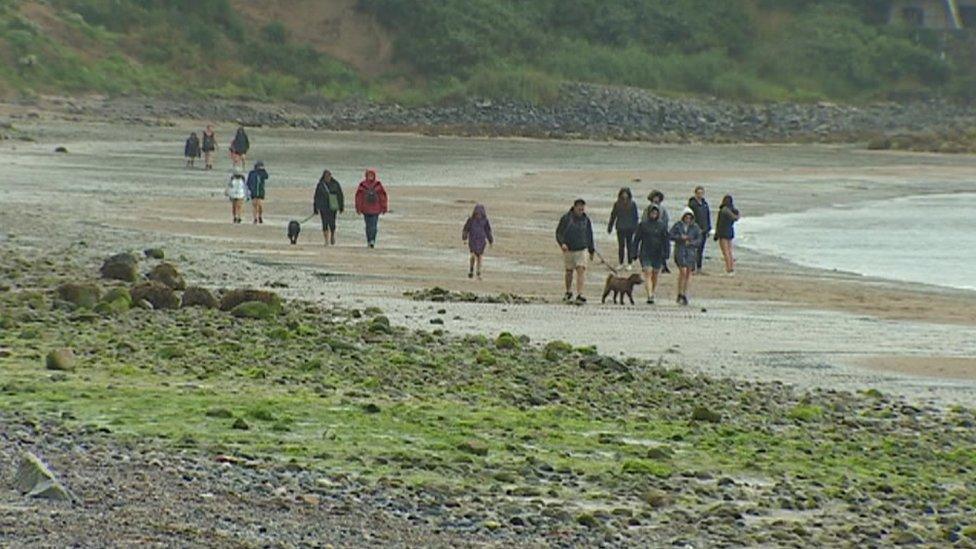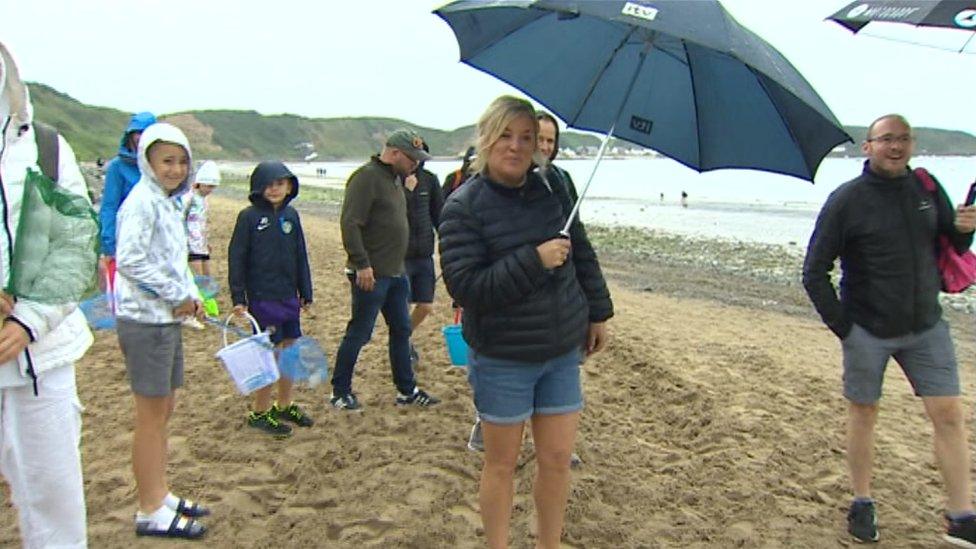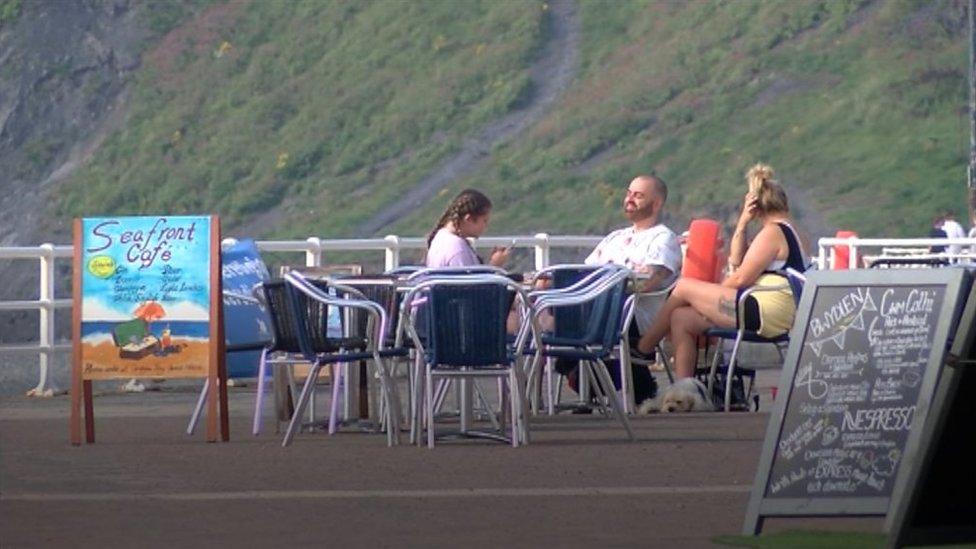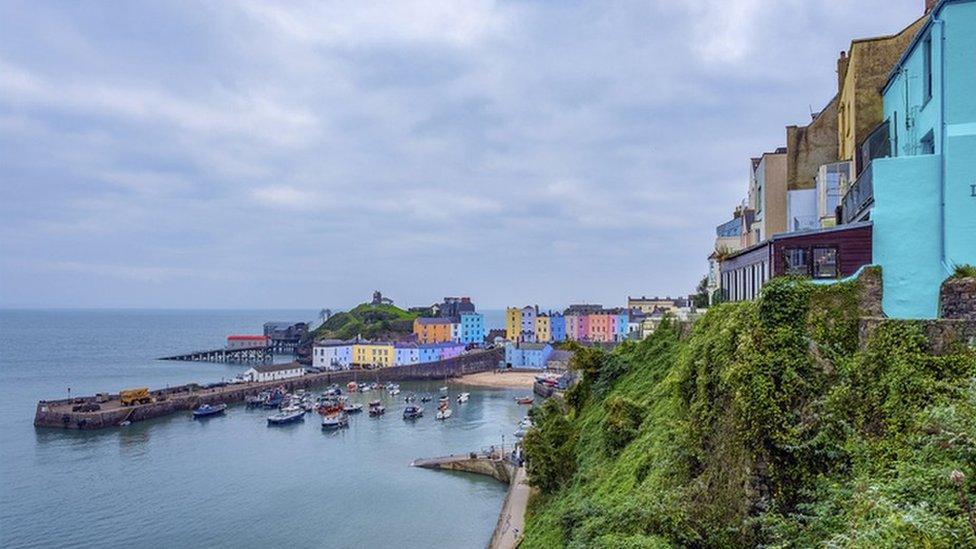Covid: Lockdown tourism fear over Elvis Festival visitors
- Published
- comments

The Elvis festival has been cancelled, with people warned not to visit Bridgend county
Visitors who had arranged to attend a now-cancelled Elvis Festival have been warned they will be breaking the law if they still turn up.
The annual festival is held in Porthcawl, in Bridgend county, which will go into lockdown at 18:00 BST on Tuesday.
People on local lockdown in south Wales need a "reasonable excuse" to leave their county.
But those under similar restrictions in England can still go on holiday.
The discrepancy has fuelled concerns over lockdown tourism.
The Welsh Government said: "The measures in England are a matter for the UK government."
The Elvis Festival, which had been due to be held this weekend, usually attracts about 35,000 fans and 100 impersonators.
But it was scrapped this year because of coronavirus, with people who had booked stays warned they could not visit the borough.
Bridgend council leader Huw David said: "There will be no Elvis here meeting them, they will be met by South Wales Police force and action will be taken against people who break the law."
After the lockdown in Bridgend county was announced on Monday, it is understood a coach of Elvis fans from Bolton who had booked tickets to the festival decided to head to Tenby in Pembrokeshire instead.
'Gaping hole in the regulations'
Andrew RT Davies, the Welsh Conservatives' health spokesman, told BBC Radio Wales it seemed "remarkable" people from Bolton were on a coach holiday in Wales.
"It doesn't seem as if they have broken any rules or regulations, I think it emphasises the need to have a joined up approach between all the countries of the United Kingdom," he said.
"If one part of the UK is allowing for such visits to be undertaken and another part of the UK is receiving those visits and testing isn't in place to make sure those people aren't leaving the area and might be spreading the virus, then obviously that is a gaping hole in the regulations."
Anyone entering or leaving a county under local lockdown restrictions in Wales must have a reasonable excuse to do so.
However the rules in England differ - with people in counties with high levels of coronavirus subject to tighter restrictions still able to go on holiday.
With Pembrokeshire not being subject to extra restrictions, the coach trip from Bolton - which currently has the highest covid rate in England - would be allowed.
What's happening in other parts of Wales?

People on local lockdown in Wales need a "reasonable excuse" to leave their local authority area
Arfon Member of the Senedd Sian Gwenllian said tensions could rise in communities over a fear of visitors spreading the virus.
"It makes no sense to me that people in places like Liverpool, Manchester and Birmingham under local restrictions can travel as they wish on their holiday to parts of north Wales and risk spreading the virus," she said.
"People are getting very worried about this once again. I fear we could see tensions rise in communities as we saw at the start of the lockdown."
She added parts of Gwynedd had been very busy in the warm weather, with "many people visiting from places where there has been a sharp increase in cases of Covid-19".
"The Welsh Government needs to make it clear to the UK government that this is not acceptable," she said.
What does the guidance for England say?
The guidance in England states that "you can travel outside your area" but "must not meet people you do not live with in their home or garden, whether inside or outside of the affected areas, unless they're in your support bubble".
"You can still go on holiday outside of the affected areas, but you should only do this with people you live with (or have formed a support bubble with)."
A Welsh Government spokesperson said: "Wales has always given a warm welcome to visitors but it's important people do not travel at this time if they have coronavirus, live with someone who is ill or think they may have symptoms.
"We want to do everything we can to keep Wales safe and prevent the spread of the virus.
"In Wales, the approach we have taken when introducing local restrictions has been different to the one in England.
"The measures in England are a matter for the UK government."
- Published19 August 2020

- Published19 August 2020

- Published12 July 2020
